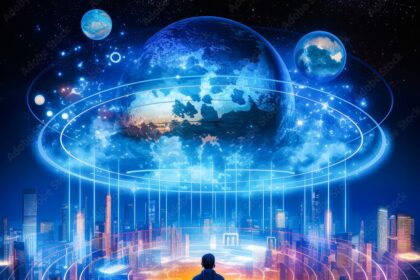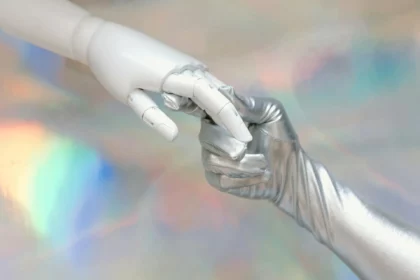Introduction
In 2025, we’re not asking if AI will change the workforce it’s already happening. ChatGPT, once seen as a support tool, is now operating at a level that is replacing entire departments from customer service and marketing to legal, HR, and even product development.
What was once the work of ten is now the output of one empowered individual and an intelligent machine. This isn’t science fiction. It’s real, rapid, and redefining what “teamwork” means in the digital era.
In this article, we explore the industries most affected, the new model of lean AI-first teams, and how decision-makers must now pivot faster than ever.
From Tool to Teammate
Since OpenAI’s launch of GPT 4o in mid-2024, enterprise adoption of generative AI has accelerated beyond predictions. What began as an assistant for email drafting or research now handles full end-to-end workflows.
In tech startups, AI runs product roadmaps. In media companies, AI generates entire campaigns. In law firms, it drafts, edits, and reviews contracts.
“AI isn’t your assistant anymore,” says Layla Daghistani, Head of Strategy at MENA-based tech firm Orbit AI. “It’s your strategist, copywriter, researcher, and analyst all in one prompt.”
Functions Where ChatGPT Has Replaced Teams
1. Marketing and Content Creation
In 2023, a full content team involved a strategist, copywriters, editors, SEO experts, and designers. Today, one AI-savvy content lead can generate blog posts, ad copy, press releases, SEO plans, social media calendars, and even design mockups within hours.
Real-world example: A Dubai-based e-commerce brand reduced its content team from 12 to 3. Revenue increased by 18% due to faster content turnaround and improved SEO ranking powered by ChatGPT’s A/B testing capabilities.
2. Customer Support
AI now resolves over 90% of customer queries at scale. Large retailers like Noon and Amazon MENA have deployed advanced ChatGPT-powered chatbots that offer 24/7 service in Arabic and English, handling refunds, complaints, and product suggestions without human touch.
3. Legal and Compliance
In-house legal teams are shrinking. GPT-4o can review contracts, draft NDAs, summarize case law, and translate legal documents across jurisdictions.
Startups using platforms like Harvey.ai (built on ChatGPT) are eliminating the need for junior lawyers, relying on one legal supervisor to vet AI-generated work.
4. Human Resources
ChatGPT handles job descriptions, candidate screening, onboarding documentation, and even performance review summaries. In 2025, HR tech integrated with GPT models is automating 70% of tasks.
Enterprise AI HR suites now allow one person to manage a 500-person workforce’s admin needs.
5. Product Development and UX Writing
From writing user flows to coding prototypes, ChatGPT is central to modern product teams. Many SaaS companies now operate with AI-led prototyping, UX copywriting, and front-end development all managed by a single product owner.
Why Entire Teams Are Disappearing
1. The Cost Efficiency Imperative
Labor costs are the largest overhead for most businesses. In 2025, companies under investor pressure to become lean and AI-optimized are replacing $500K/year teams with $40/month GPT-4o subscriptions.
According to McKinsey, 60% of companies using generative AI at scale have reported a 35–70% reduction in staffing costs in non-core departments.
2. Productivity Explosion
AI-enhanced individuals now outperform traditional teams. One strategist using GPT can outperform a five-person team in speed, data comprehension, and even quality of insights.
In venture-backed startups, speed is survival. Founders no longer hire departments they build prompt libraries.
3. The Standardization of Output
AI ensures consistency. Whether it’s branding, legal language, or customer support tone AI doesn’t deviate. For brands in regulated sectors, this has become a non-negotiable advantage.
Industries Embracing the Shift
- Tech Startups: From Silicon Valley to Riyadh, startups now go from idea to MVP in weeks using AI-led workflows.
- Media & Publishing: AI-generated news, reports, and analyses are becoming the standard.
- E-commerce: AI handles everything from ad targeting to customer service.
- Finance: Hedge funds are replacing analysts with GPT-quant hybrids.
- Education: AI is tutoring, grading, and even generating full curricula.
“We used to hire analysts. Now we hire AI strategists who know how to prompt well.” Khaled Al-Mutairi, Managing Partner, Arqa Capital”
The New Role of Humans
The future isn’t human-less. It’s human-leveraged. Roles are evolving:
- From Doers to Directors: People no longer execute; they guide, curate, and supervise AI workflows.
- Prompt Engineering as a Core Skill: Knowing how to instruct AI is now more valuable than traditional experience.
- Creative Oversight: Humans provide brand voice, emotional nuance, and ethical oversight things AI still struggles with.
Strategic Implications for Leaders
- Upskill Immediately: Invest in prompt training for all teams.
- Restructure for Lean AI Models: Reorganize departments around AI workflows.
- Ethical Guardrails: Implement transparency and responsibility protocols.
- Data Strategy: AI needs data. Own it, secure it, and structure it for generative intelligence.
The age of AI-led teams isn’t approaching. It has arrived. By 2025, companies that still rely on traditional team structures risk being outpaced and outpriced.
This is not the end of the workforce it’s the rebirth of it. The future belongs to those who can think big, act lean, and partner with AI at every level.
Let this not be your warning, but your window. The revolution is not optional it’s operational.





